年人教版中考英语九年级英语总复习教案
- 格式:doc
- 大小:1.11 MB
- 文档页数:204
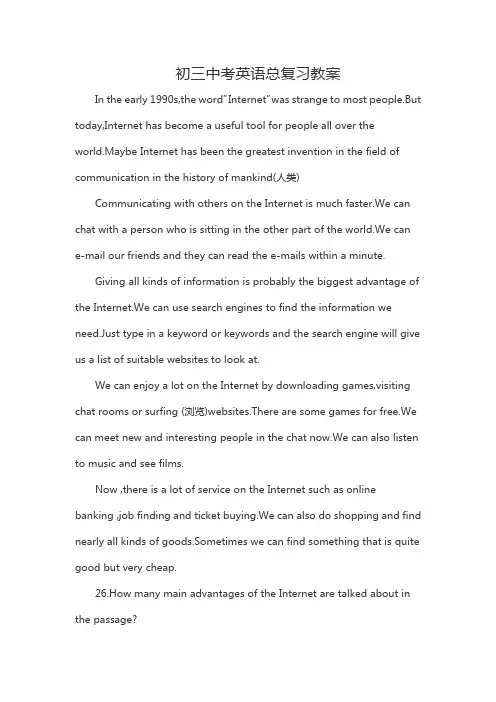
初三中考英语总复习教案In the early 1990s,the word”Internet”was strange to most people.But today,Internet has become a useful tool for people all over the world.Maybe Internet has been the greatest invention in the field of communication in the history of mankind(人类)Communicating with others on the Internet is much faster.We can chat with a person who is sitting in the other part of the world.We can e-mail our friends and they can read the e-mails within a minute.Giving all kinds of information is probably the biggest advantage of the Internet.We can use search engines to find the information we need.Just type in a keyword or keywords and the search engine will give us a list of suitable websites to look at.We can enjoy a lot on the Internet by downloading games,visiting chat rooms or surfing (浏览)websites.There are some games for free.We can meet new and interesting people in the chat now.We can also listen to music and see films.Now ,there is a lot of service on the Internet such as online banking ,job finding and ticket buying.We can also do shopping and find nearly all kinds of goods.Sometimes we can find something that is quite good but very cheap.26.How many main advantages of the Internet are talked about in the passage?A.Three.B.Four.C.Five.D.Six.27.What fact doesn’t the passage provide?A.We can find almost anything we want to know on the Internet.B.Some games on the Internet are free.C.We can buy most things we need on the Internet.D.Goods on the Internet are more expensive than those in real shops.28.Which title best gives the main idea of the passage?A.Online ShoppingB.Exchanging Information on the InternetC.The Advantages of the InternetD.Surfing the Websites on the Internet答案: BDCYou want to know about my staying in America,right?Well,to tell you the truth,it is really an eye-opening experience study here.In China,I had English classes five times a week since fifthgrade.However,I didn’t know how different textbook English could be from everyday English until I came to Hotchkiss School,Conmecticut.When I first studied English,I was told to say, “I am fine.”when people say “How are you ?”But in the US,I found that people say, “I am good.”or “Ilm tired.”One day ,someone greeted me with “What’s up ?”It ,made me confused.I thought for a moment and then smiled because I didn’t know what to say.Since then,I have discovered more and more differences between Chinese and US cultures.To my surprise,US girls spend a lot of time in the burning sun to get a tan.However ,in China ,girls try every possible way to get their skin paler,or “whiter.”I also surprised by how hard-working .US students are.InChina,schoolwork is almost everything ,so we study hard and that’it.But here,a “good”student gets good grades,does a lot for the public and plays sports or music.The kids here are so talented ,I am starting to be sorry that I gave up playing the piano at an early age and that I have never thought about sports.61.According to the writer,textbook English is _________everyday English.A.quite different fromB.the same asC.more difficult than62.What does the word “tan ”in the sixth paragraph mean in Chinese?A晒黑B晒白C 能量63.A good US student spends his/her time ________.A.only in doing homeworkB.only on sports or musicC.on studies ,sports or music and public work64.Which of the following is NOT true?A.The writer is now in US.B.American girls love to have white skin. students are talented and hard-working.65.Which is the best title for the passage?A.My Own Travel in the USB.My Studying in the USC.My Opinion about the US答案:AACBBPeople often say that the Englishman’s home is his castle.They mean that the home is very important and personal to him.Most people in Britain live in houses rather than flats,and many people own their homes.This means that they can make them individual(个体的);they can paint them,and change them in any way they like.Most house have a garden,even if it is a very small one,and the garden is usually loved.The house and the garden are the private(私人的)space of the individual.People usually like to mark their space.Are you sitting now in your home or on a train?have you marked the space around yourself asyour?If you are on the train you may put your coat or small bag on the seat beside you.If you share a flat you may have one corner or chair which is your own.Once I was travelling on a train to London.I was in a section for four people and there was a table between us .The man on the space on my side of the table at all. I was angry.Maybe he thought that he owned the whole table.I had read a book about non-verbal communication,so I took various papers out of my bag and put them on his briefcase!When I did this he stiffened and his eyes nearly popped(瞪出)out of his head.I had invaded(侵犯)his space!A few minutes later I took my papers off his case in order to read them.He immediately moved his case to his side of the table.Of course,it is possible that he just wanted to be helpful to me!If you are visiting another country you may feel that you don’t have any private space.Hotel rooms look much the same in every country in the world.All day long ,you share public spaces with o ther pople.You see the local people in their private spaces and you feel lonely and “outside”.Local people can create their private spaces by talking about things you don’t know about .And you even feel that they like you to be outside them so that they will enjoy being inside even more!This is one of the difficulties of being a traveler!But if you understand it then it helps you .Haven’t you enjoyed being part of a group and “owning”a bit of space?41.The writer was angry as he was travelling on a train to London because______.A.he had no place to sitB.someone had invaded his “space”C.too many people shared a section with himD.some other people talked about things he didn’t know about42. “…you feel lonely and ‘outside’”in paragraph 4 means that_______.A.you are alone outside the houseB.you feel lonely because you travel on your ownC.you are alone and therefore you go outside to have some funD.you feel lonely and you don’t belong to that place or that group of people43.In Paragraph 4 ,the pronoun “them’refers to(所指) “___________”.A.public spacesB.private spacesC.local peopleD.other countries44.Which of the following is TRUE according to the passage?A.British people dislike marking their space.B.You always feel at home in another country.C.Most British people prefer living in houses to flats.D.You can’t mark your private space in a foreign country.45.Tha main purpose of the passage is to tell readers to _______.A.own private spaces by living in housesB.have one corner of their own in public placesC.realize the importance of “space”in communicationD.create their private spaces by talking with local people 答案:BDCCC。
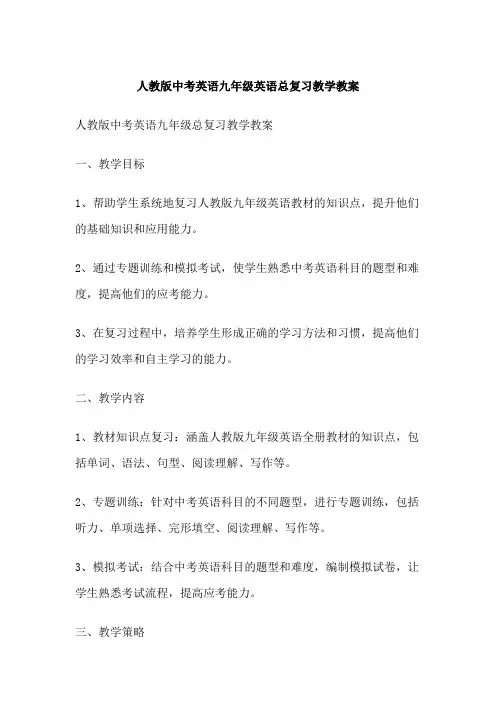
人教版中考英语九年级英语总复习教学教案人教版中考英语九年级总复习教学教案一、教学目标1、帮助学生系统地复习人教版九年级英语教材的知识点,提升他们的基础知识和应用能力。
2、通过专题训练和模拟考试,使学生熟悉中考英语科目的题型和难度,提高他们的应考能力。
3、在复习过程中,培养学生形成正确的学习方法和习惯,提高他们的学习效率和自主学习的能力。
二、教学内容1、教材知识点复习:涵盖人教版九年级英语全册教材的知识点,包括单词、语法、句型、阅读理解、写作等。
2、专题训练:针对中考英语科目的不同题型,进行专题训练,包括听力、单项选择、完形填空、阅读理解、写作等。
3、模拟考试:结合中考英语科目的题型和难度,编制模拟试卷,让学生熟悉考试流程,提高应考能力。
三、教学策略1、知识点复习:采用多种教学方法,如讲解、讨论、提问、练习等,使学生更好地掌握教材知识点。
2、专题训练:通过示范、实例分析、课堂讨论等方式,使学生掌握不同题型的解题技巧和策略。
3、模拟考试:在模拟考试中,引导学生按照考试要求和时间分配,培养他们的应考心态和策略。
四、教学评估1、课堂表现:观察学生在课堂上的表现,包括参与度、专注度、理解能力等。
2、作业和练习:检查学生完成作业和练习的情况,评估他们的学习效果和掌握程度。
3、模拟考试:分析学生在模拟考试中的表现,评估他们的应考能力和水平。
五、教学资源1、教材:人教版九年级英语全册教材。
2、教学软件:多媒体教学软件,包括教学PPT、视频、音频等。
3、学习网站:提供一些与中考英语复习相关的网站和资源,方便学生自行查阅和学习。
4、辅导材料:选择一些与中考英语相关的辅导材料,如习题集、模拟试卷等,供学生练习和提高。
六、教学进度安排根据中考时间安排和学生实际情况,可以将整个复习过程分为三个阶段:1、第一阶段:全面复习(2个月)。
按照教材章节顺序,系统地复习知识点,进行基础训练和专题训练。
2、第二阶段:强化训练(1个月)。
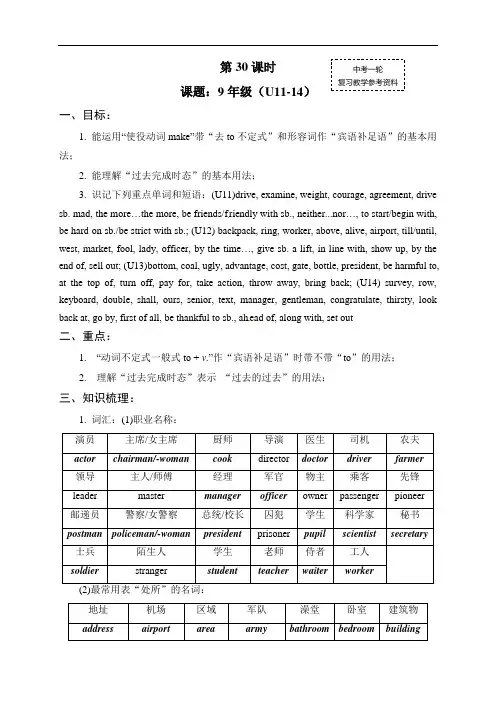
第30课时课题:9年级(U11-14)一、目标:1. 能运用“使役动词make ”带“去to 不定式”和形容词作“宾语补足语”的基本用法;2. 能理解“过去完成时态”的基本用法;3. 识记下列重点单词和短语:(U11)drive, examine, weight, courage, agreement, drive sb. mad, the more …the more, be friends/f riendly with sb., neither...nor …, to start/begin with, be hard on sb./be strict with sb.; (U12) backpack, ring, worker, above, alive, airport, till/until, west, market, fool, lady, officer, by the time …, give sb. a lift, in line with, show up, by the end of, sell out; (U13)bottom, coal, ugly, advantage, cost, gate, bottle, president, be harmful to, at the top of, turn off, pay for, take action, throw away, bring back; (U14) survey, row, keyboard, double, shall, ours, senior, text, manager, gentleman, congratulate, thirsty, look back at, go by, first of all, be thankful to sb., ah ead of, along with, set out二、重点:1. “动词不定式一般式to + v .”作“宾语补足语”时带不带“to ”的用法;2. 理解“过去完成时态”表示 “过去的过去”的用法:三、知识梳理:1. 词汇:(1)职业名称: 演员 主席/女主席 厨师 导演 医生 司机 农夫 actor chairman/-womancook director doctor driver farmer 领导 主人/师傅 经理 军官 物主乘客先锋 leader master manager officer owner passenger pioneer 邮递员警察/女警察总统/校长 囚犯 学生 科学家 秘书 postman policeman/-woman president prisoner pupil scientist secretary士兵 陌生人 学生 老师 侍者 工人soldierstrangerstudentteacherwaiterworker地址 机场 区域 军队 澡堂卧室建筑物addressairportareaarmybathroom bedroom building中考一轮 复习教学参考资料2. 句型与语法:(1)使役动词make的两个用法:五、巩固练习:(一)词汇练习(略)1.英汉互译下列单词:(1)职业名称:士兵老师侍者工人stranger student(2)最常用表“处所”的名词:卧室address airport area army bathroom building 首都电影院教室ceiling coast college company国家农场concert corner countryside floor gym 医院湖泊陆地图书馆heaven kitchen lab(oratory)会议博物馆办公室公园market nature palace运动场餐馆河流房间学校place pond剧院村庄世界动物园supermarket toilet university(3)表示“感觉、感情”方面的形容词:生气的兴奋的angry crazy excited glad happy interested 紧张的有病mad nice patient surprisedexamine(v.)→_____________(n.) comfortable(adj.) →_____(反义形容词) weight(n.) →_____________(v.) agree(v.) →____________________(v.) expect(v.) →____________(adj.) →_______________(反义形容词)work(n. & v.) →__________(n.) discovery(n.) →_________________(v.) alive(adj.) →________(v.) →______(-ly形式adj.) →______(-ing形式adj.) believable(adj.) →_________(v.) disappear(v.) →____________(反义词) wooden(adj.) →___________(n.) advantage(n.) →____________(反义词)scientific(adj.) →__________(n.) congratulate(v.) →______________(n.)thank(n.) →_____________(adj.) ahead(adv.) →_________________(n.)(二)语法练习1. 语法填空:(1) A: What ______(make) you angry?B: When people throw rubbish on the streets, it makes me ______(anger).C: Me, too. It takes me ______(want) to tell them clean up the streets.(2) I was made ______(cry) by sad movies.(3) _____ the time Mary ____(get) up, Tim had already gone into the bathroom.(4) ____ dinner time, I had already remembered all the news words of the class.(5) A: The river was so dirty. Even the river bottom _____(be) full of rubbish.B: But it ____(use) to be clean!A: Yes, but people _______(throw) litter(垃圾) into the river.B: So I think everyone in the town should _____(help) (to) clean up the river.(6) I ____(be) about to go to school ____ I found that I had left my homework in my bedroom.(7) As I ___________ (talk) with my classmates, I saw our math coming into the classroom.2. 将下列句子译成汉语:(1) When he put the noodles into a bowl, he realized that he had forgotten to add the green beans. __________________________________________________(2) Before she got a chance to say goodbye, he had got into the building.________________________________________________________3. 用英语回答下列问题:(1) What do you remember about Grade 7?________________________________________________________(2) What happened in Grade 8 that was special?________________________________________________________(3) What did you use to do that you don’t do now?________________________________________________________(4) How have you changed since you started junior high school?________________________________________________________(5) How do you think things will be different in senior high school?________________________________________________________(6) What are your plans for next year?________________________________________________________(7) What are you looking forward to?________________________________________________________(三)综合练习1. 听下面的独白,从每小题中所给的A、B、C三个选项中选出符合对话内容的最佳选项。
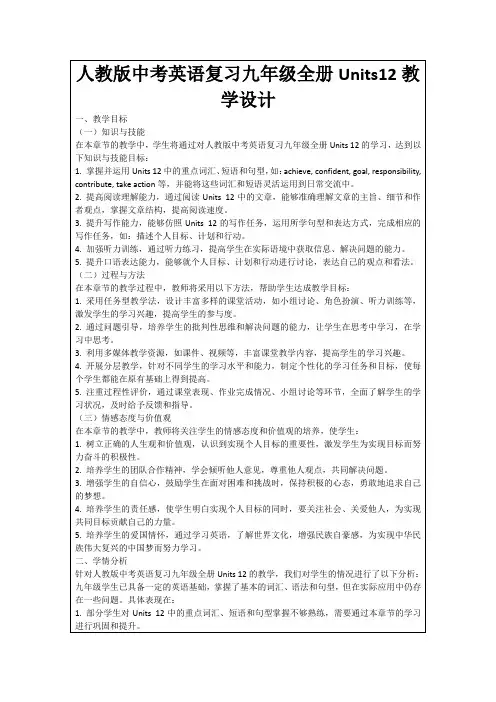
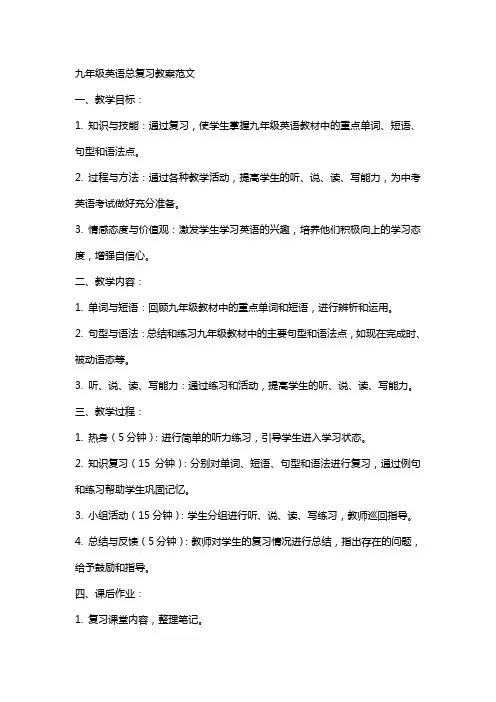
九年级英语总复习教案范文一、教学目标:1. 知识与技能:通过复习,使学生掌握九年级英语教材中的重点单词、短语、句型和语法点。
2. 过程与方法:通过各种教学活动,提高学生的听、说、读、写能力,为中考英语考试做好充分准备。
3. 情感态度与价值观:激发学生学习英语的兴趣,培养他们积极向上的学习态度,增强自信心。
二、教学内容:1. 单词与短语:回顾九年级教材中的重点单词和短语,进行辨析和运用。
2. 句型与语法:总结和练习九年级教材中的主要句型和语法点,如现在完成时、被动语态等。
3. 听、说、读、写能力:通过练习和活动,提高学生的听、说、读、写能力。
三、教学过程:1. 热身(5分钟):进行简单的听力练习,引导学生进入学习状态。
2. 知识复习(15分钟):分别对单词、短语、句型和语法进行复习,通过例句和练习帮助学生巩固记忆。
3. 小组活动(15分钟):学生分组进行听、说、读、写练习,教师巡回指导。
4. 总结与反馈(5分钟):教师对学生的复习情况进行总结,指出存在的问题,给予鼓励和指导。
四、课后作业:1. 复习课堂内容,整理笔记。
2. 完成课后练习题,提高听、说、读、写能力。
3. 准备下一节课的复习内容。
五、教学评价:1. 课堂表现:观察学生在课堂上的参与程度、发言情况和学习态度。
2. 课后作业:检查学生的作业完成情况,了解学生的学习效果。
3. 中考英语考试:关注学生的中考英语考试成绩,为后续教学提供参考。
六、教学策略:1. 采用归纳法进行语法复习,让学生通过具体例子理解并掌握语法规则。
2. 运用任务型教学法,组织学生进行小组合作,提高他们的实际运用能力。
3. 利用多媒体教学资源,如课件、视频等,增加课堂趣味性,提高学生的学习兴趣。
4. 针对学生的不同需求,给予个性化的辅导和指导,帮助他们在中考中取得好成绩。
七、教学重点与难点:1. 教学重点:九年级教材中的重点单词、短语、句型和语法点。
2. 教学难点:现在完成时、被动语态等语法点的运用和辨析。
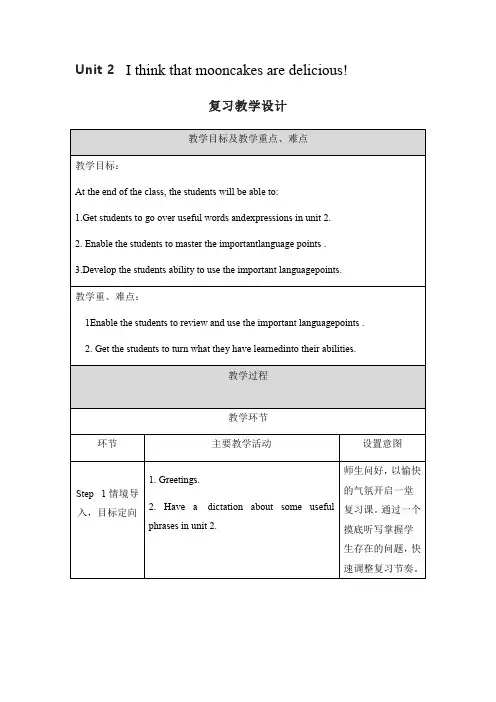
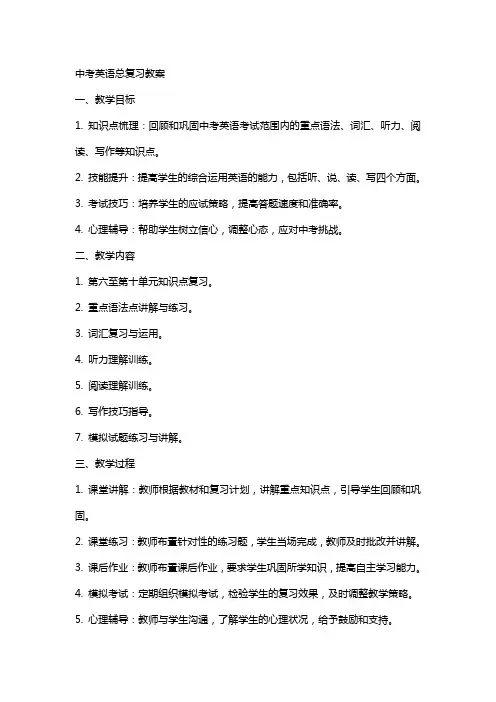
中考英语总复习教案一、教学目标1. 知识点梳理:回顾和巩固中考英语考试范围内的重点语法、词汇、听力、阅读、写作等知识点。
2. 技能提升:提高学生的综合运用英语的能力,包括听、说、读、写四个方面。
3. 考试技巧:培养学生的应试策略,提高答题速度和准确率。
4. 心理辅导:帮助学生树立信心,调整心态,应对中考挑战。
二、教学内容1. 第六至第十单元知识点复习。
2. 重点语法点讲解与练习。
3. 词汇复习与运用。
4. 听力理解训练。
5. 阅读理解训练。
6. 写作技巧指导。
7. 模拟试题练习与讲解。
三、教学过程1. 课堂讲解:教师根据教材和复习计划,讲解重点知识点,引导学生回顾和巩固。
2. 课堂练习:教师布置针对性的练习题,学生当场完成,教师及时批改并讲解。
3. 课后作业:教师布置课后作业,要求学生巩固所学知识,提高自主学习能力。
4. 模拟考试:定期组织模拟考试,检验学生的复习效果,及时调整教学策略。
5. 心理辅导:教师与学生沟通,了解学生的心理状况,给予鼓励和支持。
四、教学评价1. 课堂参与度:观察学生在课堂上的活跃程度,参与课堂提问和讨论。
2. 练习完成情况:检查学生课后练习的完成质量,及时了解学生的学习情况。
3. 模拟考试成绩:分析学生的模拟考试成绩,评估复习效果。
4. 学生反馈:收集学生的意见和建议,不断优化教学方法和内容。
五、教学资源1. 教材:人教版《初中英语教材》。
2. 教辅资料:中考英语复习资料、模拟试题、语法点讲解等。
3. 教学设备:投影仪、电脑、黑板等。
4. 网络资源:英语学习网站、在线听力、阅读材料等。
六、教学策略1. 分类讲解:将知识点进行分类,有针对性地进行讲解,使学生更好地理解和掌握。
2. 案例分析:结合实际案例,让学生更好地理解和运用知识点。
3. 互动教学:鼓励学生积极参与课堂讨论,提高课堂氛围,提高学生的学习兴趣。
4. 小组合作:组织学生进行小组合作,互相学习,互相帮助,提高学习效果。
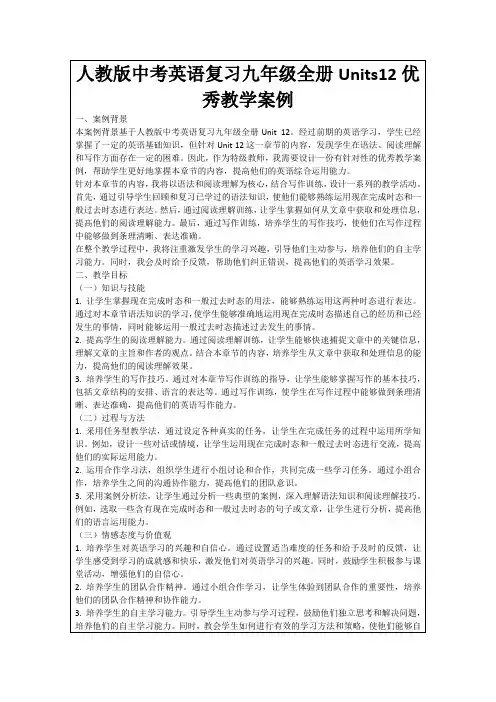
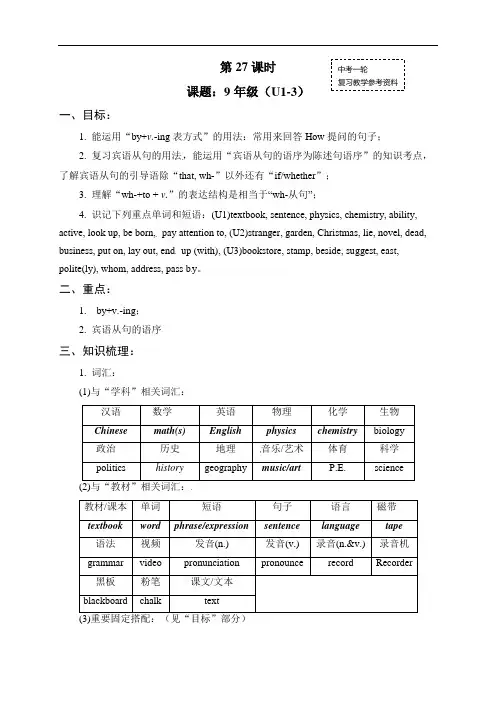
第27课时 课题:9年级(U1-3)一、目标:1. 能运用“by+v.-ing 表方式”的用法:常用来回答How 提问的句子;2. 复习宾语从句的用法,能运用“宾语从句的语序为陈述句语序”的知识考点,了解宾语从句的引导语除“that, wh-”以外还有“if/whether ”;3. 理解“wh-+to + v.”的表达结构是相当于“wh-从句”;4. 识记下列重点单词和短语:(U1)textbook, sentence, physics, chemistry, ability, active, look up, be born, pay attention to, (U2)stranger, garden, Christmas, lie, novel, dead, business, put on, lay out, end up (with), (U3)bookstore, stamp, beside, suggest, east, polite(ly), whom, address, pass b y 。
二、重点:1. by+v.-ing ;2. 宾语从句的语序三、知识梳理:1. 词汇:(1)与“学科”相关词汇:汉语 数学英语 物理 化学 生物 Chinese math(s) English physics chemistry biology 政治历史 地理 音乐/艺术 体育 科学 politicshistorygeographymusic/artP.E.science(2)与“教材”相关词汇: 教材/课本 单词 短语 句子 语言 磁带textbook word phrase/expressionsentence language tape 语法 视频 发音(n.) 发音(v.) 录音(n.&v.) 录音机 grammar video pronunciation pronouncerecord Recorder黑板粉笔课文/文本blackboard chalktext中考一轮复习教学参考资料2. 句型与语法:单元句型结构Unit 1 △By + v-ing回答以how提问的问句e.g.-- How do you learn English? -- I learn by studying with a group.-- How can I improve my pronunciation?-- One way is by listening to tapes.Unit 2 △that, if/whether引导的宾语从句e.g. I believe t hat April is the hottest month in Thailand.I wonder if/whether June is a good time to visi t Hong Kong. △What/How 引导的感叹句e.g. What fun the Water Festival is!How pretty the dragon boats were!Unit 3 △wh-引导的宾语从句e.g. Do you know where I can buy some medicine?Could you tell me when the band starts playing thi s evening? △Wh- to +动词原形e.g. -- Could you please tell me how to get to the post office?-- Sorry, I’m not sure how to get there.。
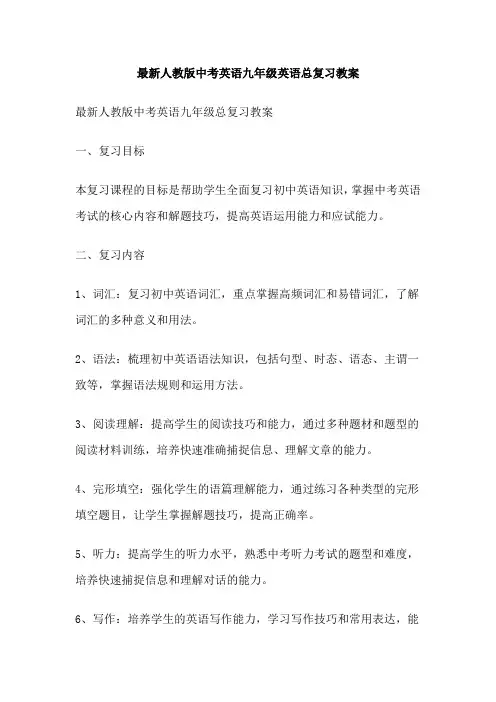
最新人教版中考英语九年级英语总复习教案最新人教版中考英语九年级总复习教案一、复习目标本复习课程的目标是帮助学生全面复习初中英语知识,掌握中考英语考试的核心内容和解题技巧,提高英语运用能力和应试能力。
二、复习内容1、词汇:复习初中英语词汇,重点掌握高频词汇和易错词汇,了解词汇的多种意义和用法。
2、语法:梳理初中英语语法知识,包括句型、时态、语态、主谓一致等,掌握语法规则和运用方法。
3、阅读理解:提高学生的阅读技巧和能力,通过多种题材和题型的阅读材料训练,培养快速准确捕捉信息、理解文章的能力。
4、完形填空:强化学生的语篇理解能力,通过练习各种类型的完形填空题目,让学生掌握解题技巧,提高正确率。
5、听力:提高学生的听力水平,熟悉中考听力考试的题型和难度,培养快速捕捉信息和理解对话的能力。
6、写作:培养学生的英语写作能力,学习写作技巧和常用表达,能够写出符合语法规则、表达清晰、语句通顺的短文。
三、复习方法1、系统复习:按照教材的知识体系,系统地梳理和复习初中英语知识,做到全面覆盖,突出重点。
2、精讲多练:通过典型例题和练习题,让学生在实践中掌握英语知识和解题技巧,提高运用能力和应试能力。
3、分类指导:针对不同题型和考试内容,进行分类指导,让学生熟悉各种题型的解题方法和技巧。
4、差异教学:根据学生的不同水平和需求,进行差异教学,提供个性化的辅导和指导,让每个学生都能得到提高。
四、复习步骤1、知识梳理:按照教材顺序,全面梳理初中英语知识,形成系统化的知识体系。
2、专题复习:按照中考英语考试的题型和专题,进行分类复习,重点突破阅读理解、完形填空、写作等难点。
3、综合练习:组织学生进行中考英语模拟考试,让学生熟悉考试流程和答题技巧,提高应试能力。
4、查缺补漏:针对学生的薄弱环节和易错知识点,进行重点讲解和强化训练,查缺补漏,提高复习效果。
5、考前冲刺:在中考前一段时间,组织学生进行中考英语冲刺训练,进行最后一轮的复习和巩固,帮助学生调整心态,树立信心。
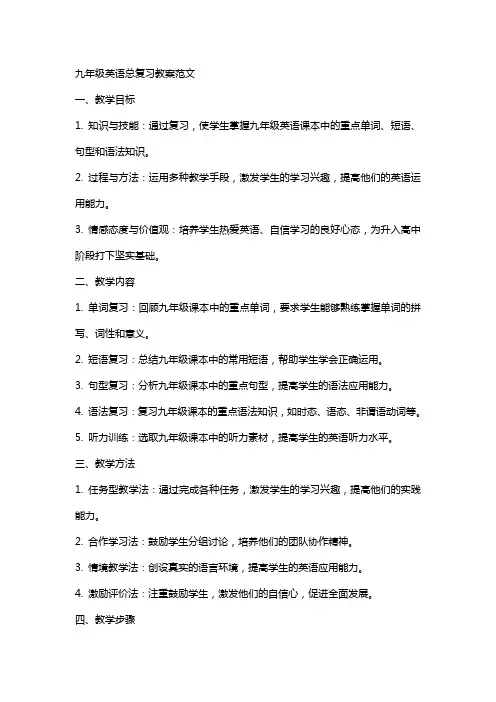
九年级英语总复习教案范文一、教学目标1. 知识与技能:通过复习,使学生掌握九年级英语课本中的重点单词、短语、句型和语法知识。
2. 过程与方法:运用多种教学手段,激发学生的学习兴趣,提高他们的英语运用能力。
3. 情感态度与价值观:培养学生热爱英语、自信学习的良好心态,为升入高中阶段打下坚实基础。
二、教学内容1. 单词复习:回顾九年级课本中的重点单词,要求学生能够熟练掌握单词的拼写、词性和意义。
2. 短语复习:总结九年级课本中的常用短语,帮助学生学会正确运用。
3. 句型复习:分析九年级课本中的重点句型,提高学生的语法应用能力。
4. 语法复习:复习九年级课本的重点语法知识,如时态、语态、非谓语动词等。
5. 听力训练:选取九年级课本中的听力素材,提高学生的英语听力水平。
三、教学方法1. 任务型教学法:通过完成各种任务,激发学生的学习兴趣,提高他们的实践能力。
2. 合作学习法:鼓励学生分组讨论,培养他们的团队协作精神。
3. 情境教学法:创设真实的语言环境,提高学生的英语应用能力。
4. 激励评价法:注重鼓励学生,激发他们的自信心,促进全面发展。
四、教学步骤1. 课堂导入:引导学生回顾已学知识,为新课复习做好铺垫。
2. 单词复习:采用游戏、竞赛等形式,激发学生学习兴趣,巩固单词记忆。
3. 短语复习:通过例句和练习,让学生学会正确运用短语。
4. 句型复习:分析句型结构,让学生掌握句型特点,提高语法应用能力。
5. 语法复习:通过实例和练习,巩固语法知识,提高学生的语法水平。
6. 听力训练:播放听力素材,学生听后进行讨论和回答,提高听力理解能力。
五、课后作业1. 单词默写:要求学生课后复习单词,加强记忆。
2. 课后练习:完成课本后的练习题,巩固所学知识。
3. 小组活动:分组进行口语交流,提高英语口语能力。
4. 学习计划:制定个人学习计划,为下一步学习做好准备。
六、教学评估1. 课堂参与度:观察学生在课堂上的活跃程度,了解他们的学习兴趣。
初三中考英语总复习教案In the early 1990s,the word”Internet”was strange to most people.But today,Internet has become a useful tool for people all over the world.Maybe Internet has been the greatest invention in the field of communication in the history of mankind(人类)Communicating with others on the Internet is much faster.We can chat with a person who is sitting in the other part of the world.We can e-mail our friends and they can read the e-mails within a minute.Giving all kinds of information is probably the biggest advantage of the Internet.We can use search engines to find the information we need.Just type in a keyword or keywords and the search engine will give us a list of suitable websites to look at.We can enjoy a lot on the Internet by downloading games,visiting chat rooms or surfing (浏览)websites.There are some games for free.We can meet new and interesting people in the chat now.We can also listen to music and see films.Now ,there is a lot of service on the Internet such as online banking ,job finding and ticket buying.We can also do shopping and find nearly all kinds of goods.Sometimes we can find something that is quite good but very cheap.26.How many main advantages of the Internet are talked about in the passage?A.Three.B.Four.C.Five.D.Six.27.What fact doesn’t the passage provide?A.We can find almost anything we want to know on the Internet.B.Some games on the Internet are free.C.We can buy most things we need on the Internet.D.Goods on the Internet are more expensive than those in real shops.28.Which title best gives the main idea of the passage?A.Online ShoppingB.Exchanging Information on the InternetC.The Advantages of the InternetD.Surfing the Websites on the Internet答案: BDCYou want to know about my staying in America,right?Well,to tell you the truth,it is really an eye-opening experience study here.In China,I had English classes five times a week since fifthgrade.However,I didn’t know how different textbook English could be from everyday English until I came to Hotchkiss School,Conmecticut.When I first studied English,I was told to say, “I am fine.”when people say “How are you ?”But in the US,I found that people say, “I am good.”or “Ilm tired.”One day ,someone greeted me with “What’s up ?”It ,made me confused.I thought for a moment and then smiled because I didn’t know what to say.Since then,I have discovered more and more differences between Chinese and US cultures.To my surprise,US girls spend a lot of time in the burning sun to get a tan.However ,in China ,girls try every possible way to get their skin paler,or “whiter.”I also surprised by how hard-working .US students are.InChina,schoolwork is almost everything ,so we study hard and that’it.But here,a “good”student gets good grades,does a lot for the public and plays sports or music.The kids here are so talented ,I am starting to be sorry that I gave up playing the piano at an early age and that I have never thought about sports.61.According to the writer,textbook English is _________everyday English.A.quite different fromB.the same asC.more difficult than62.What does the word “tan ”in the sixth paragraph mean in Chinese?A晒黑B晒白C 能量63.A good US student spends his/her time ________.A.only in doing homeworkB.only on sports or musicC.on studies ,sports or music and public work64.Which of the following is NOT true?A.The writer is now in US.B.American girls love to have white skin. students are talented and hard-working.65.Which is the best title for the passage?A.My Own Travel in the USB.My Studying in the USC.My Opinion about the US答案:AACBBPeople often say that the Englishman’s home is his castle.They mean that the home is very important and personal to him.Most people in Britain live in houses rather than flats,and many people own their homes.This means that they can make them individual(个体的);they can paint them,and change them in any way they like.Most house have a garden,even if it is a very small one,and the garden is usually loved.The house and the garden are the private(私人的)space of the individual.People usually like to mark their space.Are you sitting now in your home or on a train?have you marked the space around yourself asyour?If you are on the train you may put your coat or small bag on the seat beside you.If you share a flat you may have one corner or chair which is your own.Once I was travelling on a train to London.I was in a section for four people and there was a table between us .The man on the space on my side of the table at all. I was angry.Maybe he thought that he owned the whole table.I had read a book about non-verbal communication,so I took various papers out of my bag and put them on his briefcase!When I did this he stiffened and his eyes nearly popped(瞪出)out of his head.I had invaded(侵犯)his space!A few minutes later I took my papers off his case in order to read them.He immediately moved his case to his side of the table.Of course,it is possible that he just wanted to be helpful to me!If you are visiting another country you may feel that you don’t have any private space.Hotel rooms look much the same in every country in the world.All day long ,you share public spaces with o ther pople.You see the local people in their private spaces and you feel lonely and “outside”.Local people can create their private spaces by talking about things you don’t know about .And you even feel that they like you to be outside them so that they will enjoy being inside even more!This is one of the difficulties of being a traveler!But if you understand it then it helps you .Haven’t you enjoyed being part of a group and “owning”a bit of space?41.The writer was angry as he was travelling on a train to London because______.A.he had no place to sitB.someone had invaded his “space”C.too many people shared a section with himD.some other people talked about things he didn’t know about42. “…you feel lonely and ‘outside’”in paragraph 4 means that_______.A.you are alone outside the houseB.you feel lonely because you travel on your ownC.you are alone and therefore you go outside to have some funD.you feel lonely and you don’t belong to that place or that group of people43.In Paragraph 4 ,the pronoun “them’refers to(所指) “___________”.A.public spacesB.private spacesC.local peopleD.other countries44.Which of the following is TRUE according to the passage?A.British people dislike marking their space.B.You always feel at home in another country.C.Most British people prefer living in houses to flats.D.You can’t mark your private space in a foreign country.45.Tha main purpose of the passage is to tell readers to _______.A.own private spaces by living in housesB.have one corner of their own in public placesC.realize the importance of “space”in communicationD.create their private spaces by talking with local people 答案:BDCCC。
九年级英语总复习教案第一章:英语语法复习一、教学目标1. 回顾和巩固九年级英语课本中出现的语法知识,包括时态、语态、非谓语动词、情态动词、名词性从句等。
2. 提高学生运用英语语法知识进行交际的能力。
二、教学内容1. 时态:一般现在时、一般过去时、一般将来时、现在进行时、过去进行时、现在完成时、过去完成时等。
2. 语态:被动语态的构成和用法。
3. 非谓语动词:动名词、分词和不定式的用法和区别。
4. 情态动词:can、may、must、should、will等的情态动词的用法和区别。
5. 名词性从句:宾语从句、表语从句、同位语从句的构成和用法。
三、教学方法采用讲解、举例、练习、小组讨论等方式进行教学。
四、教学步骤1. 回顾每个语法知识点的构成和用法。
2. 通过例句和练习,让学生理解和掌握每个语法知识点的实际运用。
3. 组织小组讨论,让学生互相交流和巩固语法知识点。
五、作业与评价1. 布置练习题,让学生巩固所学语法知识点。
2. 课堂互动提问,检查学生对语法知识点的掌握情况。
第二章:英语词汇复习一、教学目标1. 回顾和巩固九年级英语课本中出现的重点词汇和短语。
2. 提高学生运用英语词汇进行交际的能力。
二、教学内容1. 重点词汇:动词、名词、形容词、副词等。
2. 短语:固定搭配和常用短语。
三、教学方法采用讲解、举例、练习、小组讨论等方式进行教学。
四、教学步骤1. 回顾每个重点词汇的词义、用法和搭配。
2. 通过例句和练习,让学生理解和掌握每个重点词汇的实际运用。
3. 组织小组讨论,让学生互相交流和巩固词汇。
五、作业与评价1. 布置练习题,让学生巩固所学词汇。
2. 课堂互动提问,检查学生对词汇的掌握情况。
第三章:英语听力复习一、教学目标1. 回顾和巩固九年级英语课本中出现的听力材料和技巧。
2. 提高学生的英语听力水平和理解能力。
二、教学内容1. 听力材料:对话、短文、新闻报道等。
2. 听力技巧:预测、主旨大意、细节理解、逻辑推理等。
中考英语总复习教案一语法重点:一般现在时态 (Simple Present tense)难点突破:一般现在时态中第三人称时动词加“s”的用法知识目标:通过操练、点评、专项练习等方式复习“一般现在时态”的时态结构。
复习步骤设计:(一)词汇复习Revision of the words and phrases learnt in UnitOne,dictationof the main ones。
(此环节也可根据中考词汇表顺序进行听写检查)(二)对话操练Dialogue Acting—ask Ss to act out some dialogues aboutWhat do you usually do on Sundays/in the evening? (此环节也可以采取学生达标积分制进行,即复习阶段课前对话必须人人参与)(三)语法复习:一般现在时态:(A) 概念:表示某人/某事物经常发生的动作、习惯、状态等。
(B) 时态信号:常与sometimes, often, usually, always, every day, in the morning, on Sunday 等词连用。
(C) 动词形式:用实义动词原形,第三人称时用动词加“s”形式,简称“三单动s”形式,“Be”动词用“am/ is/ are ”的形式。
(D)情态动词后面直接加实义动词原形。
(E) 在某些动词后面须用动词原形进行搭配,如let sb do sth, You’d beterr do sth 等。
例解:1、Now let me ____ your names, OK?A. callB. to callC.calling D. calls此题应选用“A”项。
在“Let sb.”后面的结构中应该用动词原形结构,不可以用其它形式,所以B项、C项和D项都是错误的。
2、He ________ the washing on Sundays. He _____ it on Saturdays.A. doesn’t/ doesB. don’t do/does C. doesn’t do/ does D. not does/ does此题应选用“C”项。
――可编辑修改,可打印
别找了你想要的都有!
精品教育资料全册教案,,试卷,教学课件,教学设计等一站式服务
全力满足教学需求,真实规划教学环节
最新全面教学资源,打造完美教学模式
2019年人教版中考英语九年级英语
总复习教案
学业考试主要侧重考查学生的语言技能、语言知识、跨文化交际意识和跨文化交际能力。
有以下考试内容与要求:(一)语言知识要求考生能够恰当运用基本的语音、语法知识,学会使
用1600 个单词和300 个习惯用语或固定搭配。
本部分侧重考查学生在一定的语境中灵活运用语音知识、语法知识、词汇知识等语言知识的能力。
2。